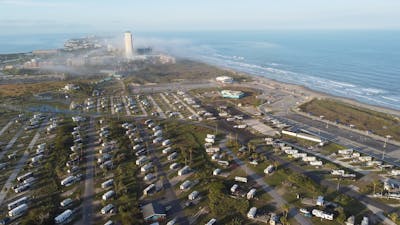How to Start a Mobile Home Park and Trailer Park: A Comprehensive Guide in 9 Steps


Starting a mobile home park or trailer park can be a profitable venture if approached correctly. Whether you’re interested in providing affordable housing or creating a business that generates steady income, the process of developing such a park involves several critical steps.
In this article, we’ll discuss in detail how to start a mobile home park and how to start a trailer park, offering a comprehensive guide to help you navigate this potentially lucrative business opportunity.
Table of Contents
1. Understanding the Difference Between Mobile Home Parks and Trailer Parks
Before diving into the process of starting these parks, it’s important to distinguish between a mobile home park and a trailer park. While the terms are often used interchangeably, they do have subtle differences.
A mobile home park typically refers to a designated area where individuals can place mobile homes or manufactured homes that serve as permanent residences. These homes are usually more modern, equipped with all the amenities of a traditional home.
On the other hand, a trailer park tends to host more temporary or smaller homes, such as RVs or older-style mobile homes. While the management principles for both types of parks are similar, understanding the differences will help you target the right market for your business.
2. Researching the Market and Choosing a Location
The success of your mobile home or trailer park largely depends on the location. A key step in learning how to start a mobile home park is conducting thorough market research. You’ll want to find out if there’s a demand for affordable housing in the area you’re considering. Additionally, the location should be easily accessible, with basic infrastructure such as water, electricity, and sewer lines.
When looking for a location, consider the following factors:
- Proximity to cities or towns: Parks closer to urban areas tend to attract more tenants due to job opportunities and amenities.
- Zoning laws: Ensure that the land is zoned for residential use and that there are no restrictions on operating a mobile home or trailer park in that area.
- Competition: Check if there are other mobile home or trailer parks in the area, and evaluate their occupancy rates.
3. Obtaining the Necessary Permits and Licenses
Navigating the regulatory landscape is crucial when understanding how to start a trailer park or mobile home park. You’ll need to comply with local, state, and federal regulations to avoid legal issues down the road.
Common permits and licenses include:
- Zoning approval: You must ensure that your property is zoned for a mobile home or trailer park. Zoning laws vary by location, so check with your local zoning board.
- Business license: A general business license is required to operate any business, including a mobile home or trailer park.
- Health department permits: In some areas, you may need approval from the health department to ensure that your park has safe sanitation and water systems.
You can visit the U.S. Department of Housing and Urban Development (HUD) website for federal guidelines on manufactured housing. For state-specific regulations, visit your state’s housing department or local government offices.
4. Developing the Land
Once you’ve secured a location and the necessary permits, the next step is developing the land. This is one of the most expensive and time-consuming parts of learning how to start a mobile home park or trailer park.
Key elements of land development:
- Infrastructure: You’ll need to install utility lines for water, electricity, gas, and sewer systems. In some cases, you may also need to build roads within the park.
- Plotting lots: Divide the land into individual lots where homes or trailers will be placed. The size of the lots should meet local regulations.
- Common areas: Many successful parks include common areas like playgrounds, picnic areas, or community centers to enhance the appeal of the park.
You’ll also need to ensure that your park complies with accessibility standards set forth by the Americans with Disabilities Act (ADA).
5. Setting Park Rules and Regulations
To maintain order and appeal in your park, you’ll need to establish clear rules and regulations for tenants. These should cover everything from rent payments to the maintenance of individual lots.
Some important rules to consider:
- Home standards: Specify the types of homes allowed in the park, such as age, size, and condition.
- Pet policies: Establish whether pets are allowed and what restrictions apply (e.g., size, breed).
- Common area usage: Define the rules for using shared spaces, like parking lots or recreation areas.
Clear rules will ensure smooth operations and help avoid conflicts between management and tenants.
6. Financing Your Mobile Home Park
Understanding how to finance your project is a crucial part of learning how to start a trailer park or mobile home park. The costs can vary widely, but they typically include land acquisition, infrastructure development, permits, and operational costs.
Financing options include:
- Bank loans: Traditional bank loans are a popular option, especially for those with good credit and a solid business plan.
- Private investors: You can also seek investment from private individuals or firms who are interested in real estate ventures.
- Government grants or loans: In some cases, you may qualify for government assistance, particularly if you plan to provide affordable housing.
7. Marketing Your Mobile Home or Trailer Park
Once your park is developed and ready for tenants, the next step is marketing. Your marketing efforts will be crucial in attracting tenants and ensuring the park is fully occupied.
Effective marketing strategies include:
- Online listings: Utilize online platforms such as Craigslist, Zillow, or specialized mobile home park websites.
- Social media: Create a presence on social media platforms like Facebook or Instagram to reach potential tenants.
- Local advertising: Use flyers, billboards, and newspaper ads to target local residents who may be looking for affordable housing.
8. Managing Your Mobile Home or Trailer Park
Once tenants move in, managing the park becomes a critical task. A well-managed park will ensure tenant satisfaction, which leads to higher occupancy rates and fewer disputes.
Key management responsibilities include:
- Collecting rent: Set up a reliable system for rent collection, whether it’s through online payments or traditional methods like checks.
- Maintenance: Ensure that the park is well-maintained, including roads, utilities, and common areas.
- Tenant relations: Good communication with tenants is essential. Address their concerns promptly and make sure they understand the park’s rules.
9. Common Challenges and How to Overcome Them
Running a mobile home or trailer park is not without its challenges. These can range from financial difficulties to tenant disputes.
Some common challenges include:
- High vacancy rates: This can be addressed by improving marketing efforts or lowering rental rates temporarily to attract more tenants.
- Maintenance issues: Regular inspections and preventative maintenance can help avoid costly repairs down the road.
- Tenant disputes: Having a clear set of rules and a solid lease agreement can help prevent and resolve conflicts with tenants.
10. FAQs About Starting a Mobile Home Park or Trailer Park
1. How much does it cost to start a mobile home park?
The cost to start a mobile home park varies based on location, size, and infrastructure needs. On average, expect to spend anywhere from $500,000 to several million dollars.
2. Do I need a license to operate a mobile home or trailer park?
Yes, you will need a business license as well as permits for zoning, health, and safety standards, depending on your location.
3. Can I finance the construction of a mobile home park?
Yes, financing options include bank loans, private investors, and even government assistance programs aimed at affordable housing.
4. How do I find tenants for my park?
Effective marketing strategies include online listings, social media campaigns, and local advertisements to reach potential tenants.
5. Are there government resources to help with starting a mobile home park?
Yes, the U.S. Department of Housing and Urban Development (HUD) offers guidelines for manufactured housing, and local state housing departments can provide additional resources.
Conclusion : How to Start a Mobile Home Park and Trailer Park ?
Starting a mobile home park or trailer park is a large but potentially rewarding venture. Understanding how to start a mobile home park involves thorough research, land acquisition, and regulatory compliance.
Similarly, learning how to start a trailer park follows many of the same steps, with some slight variations depending on the type of homes you plan to accommodate. By planning carefully, securing the necessary permits, and marketing effectively, you can build a successful and profitable business in the affordable housing sector.
Check out our other interesting posts on the top-selling items on eBay and Etsy, where you’ll find inspiration for high-demand products. Additionally, explore our tips on effective advertising ideas to boost your online sales, and don’t miss our recommendations for the best POS systems to streamline your small business operations. Finally, ensure your workspace is fully equipped by consulting our ultimate office supplies list.



Post Comment